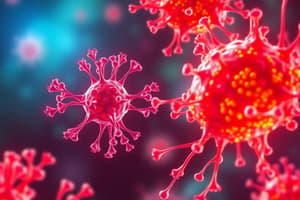Podcast
Questions and Answers
Which cells target intracellularly infected cells and activate macrophages to become microbicidal?
Which cells target intracellularly infected cells and activate macrophages to become microbicidal?
- Dendritic cells
- CD4 Th1 cells (correct)
- T helper cells
- CD8 cytotoxic T cells
Which cells do not require co-stimulation and bind tightly to target cells for a long time to release effector molecules directly to the target cell?
Which cells do not require co-stimulation and bind tightly to target cells for a long time to release effector molecules directly to the target cell?
- Dendritic cells
- Cytotoxic CD8 T cells
- Effector T cells (correct)
- T helper cells
Which cells induce target cells to undergo programmed cell death and release cytotoxic effector proteins contained in their granules?
Which cells induce target cells to undergo programmed cell death and release cytotoxic effector proteins contained in their granules?
- Effector T cells
- Cytotoxic CD8 T cells (correct)
- T helper cells
- Dendritic cells
Which cells are particularly important for acting on macrophages and B cells that have taken up antigen but may not be expressing co-stimulatory molecules?
Which cells are particularly important for acting on macrophages and B cells that have taken up antigen but may not be expressing co-stimulatory molecules?
Which cells are armed with effector molecules and have activation requirements different from naïve T cells?
Which cells are armed with effector molecules and have activation requirements different from naïve T cells?
Which cells play a role in inhibiting viral replication and increasing MHC1?
Which cells play a role in inhibiting viral replication and increasing MHC1?
Which cells target cells infected intracellularly and are hidden from the effects of antibodies and cytotoxic CD8 T cells?
Which cells target cells infected intracellularly and are hidden from the effects of antibodies and cytotoxic CD8 T cells?
Which cells release IFNg to inhibit viral replication and increase MHC1, in addition to inducing programmed cell death in target cells?
Which cells release IFNg to inhibit viral replication and increase MHC1, in addition to inducing programmed cell death in target cells?
Which cells require 2 signals to activate macrophages to become microbicidal?
Which cells require 2 signals to activate macrophages to become microbicidal?
Which cells are involved in delivering signals like IFNg and a sensitizing signal to activate macrophages to become microbicidal?
Which cells are involved in delivering signals like IFNg and a sensitizing signal to activate macrophages to become microbicidal?
Which cells play a role in inhibiting viral replication and increasing MHC1, in addition to inducing programmed cell death in target cells?
Which cells play a role in inhibiting viral replication and increasing MHC1, in addition to inducing programmed cell death in target cells?
Which cells induce target cells to undergo apoptosis and release cytotoxic effector proteins contained in their granules?
Which cells induce target cells to undergo apoptosis and release cytotoxic effector proteins contained in their granules?
Flashcards are hidden until you start studying
Study Notes
Cellular Interactions
- Cells that target intracellularly infected cells and activate macrophages to become microbicidal are CD4+ T cells (Th1 cells).
- CD4+ T cells do not require co-stimulation and bind tightly to target cells for a long time to release effector molecules directly to the target cell.
Effector Functions
- CD8+ T cells induce target cells to undergo programmed cell death (apoptosis) and release cytotoxic effector proteins contained in their granules.
- Armed CD8+ T cells have activation requirements different from naïve T cells.
Macrophage Activation
- CD4+ T cells are particularly important for acting on macrophages and B cells that have taken up antigen but may not be expressing co-stimulatory molecules.
- CD4+ T cells require 2 signals to activate macrophages to become microbicidal.
- CD4+ T cells are involved in delivering signals like IFNg and a sensitizing signal to activate macrophages to become microbicidal.
Anti-Viral Mechanisms
- CD4+ T cells release IFNg to inhibit viral replication and increase MHC1, in addition to inducing programmed cell death in target cells.
- CD8+ T cells play a role in inhibiting viral replication and increasing MHC1, in addition to inducing programmed cell death in target cells.
Targeting Intracellular Infections
- CD8+ T cells target cells infected intracellularly and are hidden from the effects of antibodies and cytotoxic CD8 T cells.
Studying That Suits You
Use AI to generate personalized quizzes and flashcards to suit your learning preferences.




